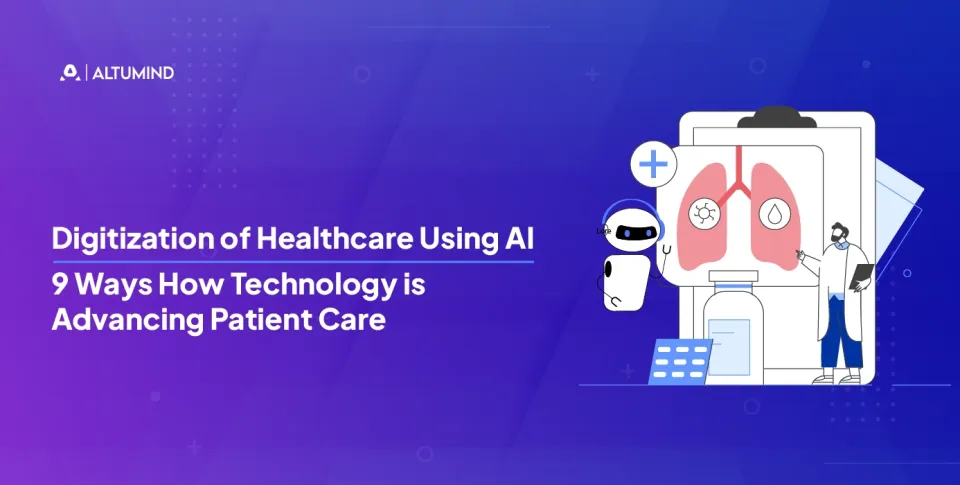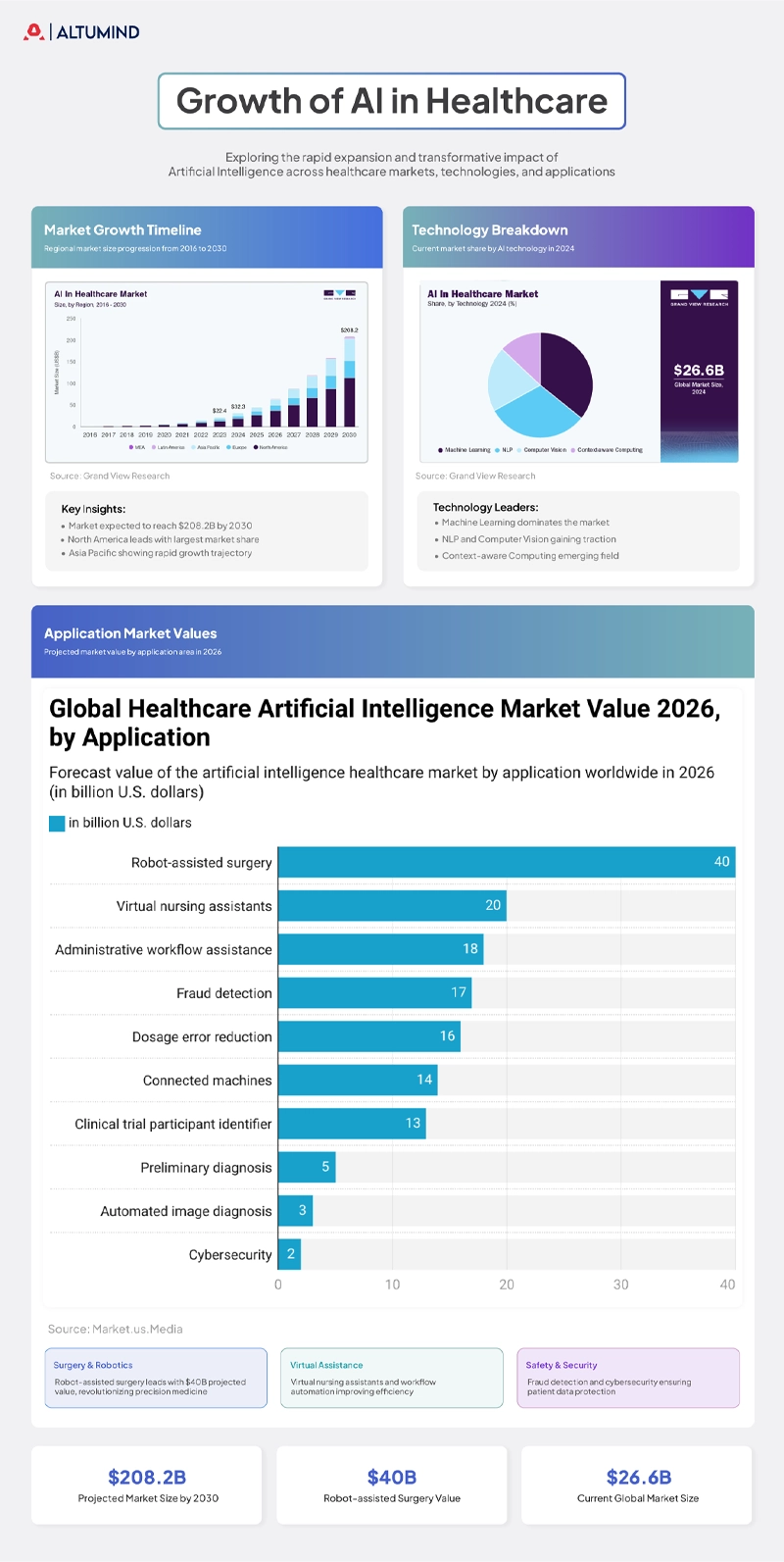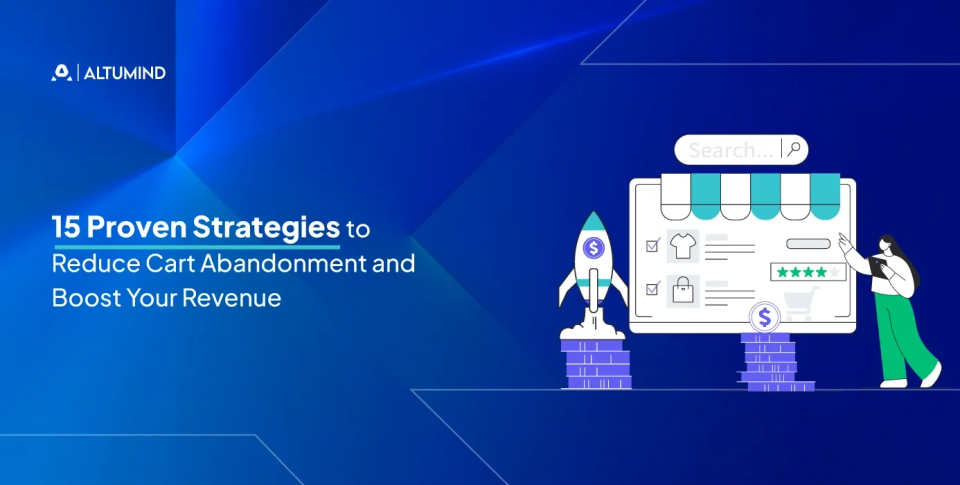Digitization of Healthcare Using AI: 9 Ways How Technology is Advancing Patient Care

Healthcare systems are experiencing exploding data volumes and rising costs, which are straining clinical teams and budgets. Leaders are facing the risk of declining quality of treatment and rising concerns related to patient safety.
Inefficient records, slow processes, and alert fatigue are undermining clinician productivity and well-being. Every delay is costing revenue, reputation, and measurable outcomes.
However, times are changing, and care delivery is moving toward smarter decisions and faster outcomes, and this is because of digitization of healthcare using AI. Leaders in healthcare are taking a step forward and joining the technological shift for making patient care safer and operations sharper.
If you are curious to know what revolutionary changes are happening, keep reading. We will look at strategic ways of how digitization of healthcare using AI is reimagining healthcare delivery, improving outcomes for patients, and unlocking new efficiencies for providers.
Growth of AI in Healthcare

AI is no longer a peripheral experiment in healthcare; it is becoming central to how systems operate and deliver care. Global leaders are advancing AI adoption, recognizing its role in solving capacity challenges, improving efficiency, and sustaining financial health.
In 2024, the global AI in healthcare market was valued at USD 26.57 billion. By 2030, it is projected to reach USD 187.69 billion, growing at a CAGR of 38.62% between 2025 and 2030. North America led the sector in 2024, commanding more than 54% of the global revenue share, and continues to set the pace in AI-driven digitization of healthcare.
David Lubarsky, MD, CEO & Vice Chancellor of Human Health Sciences at UC Davis Health, emphasized the urgency of this shift:
“Health systems face strained hospital capacities, burnt-out physicians and care teams, and escalating per-patient costs. All these challenges demand we revolutionize care delivery with AI and digital health technologies such as remote patient monitoring.”
Modern healthcare can no longer afford to operate with outdated workflows. Digitization of healthcare using AI, ML, RPA, analytics, and IoT streamlines processes, strengthens compliance, reduces risks, and makes care delivery more accessible.
The result is a connected ecosystem where predictive analytics, personalized treatments, and intelligent automation drive higher efficiency and improved patient outcomes. With leaders around the world voicing similar calls, the adoption of AI in healthcare is rapidly moving from a future concept to a present-day mandate.
Benefits of AI-driven Digitization
1. Faster Diagnosis
AI-powered imaging and data analytics are enabling clinicians to detect conditions earlier and with higher precision. What once took hours of manual review is now being completed in minutes, giving patients quicker access to treatment.
2. Reduced Human Error
Digitization reduces the fatigue and oversight risks common in complex clinical settings. Algorithms flag inconsistencies in records, prescriptions, and test results, helping doctors make safer, more accurate decisions.
3. Cost Savings in Operations
Automating repetitive tasks (from scheduling to billing) lower administrative costs across hospitals and clinics. This efficiency not only frees up budgets but also redirects resources to frontline patient care.
4. Personalized Treatment
Patient data, when digitized and analyzed, allows care plans to be tailored at an individual level. From genetic profiles to lifestyle patterns, treatment is moving from generic protocols to precision-based interventions.
5. Improved Patient Experience
Digital platforms powered by AI make care more connected and accessible. Patients benefit from shorter waiting times, better communication, and consistent monitoring even outside hospital walls.
Top Companies Leveraging AI in Healthcare
1. Mayo Clinic: Clinical Decision Support and Generative AI
Mayo Clinic is working with Google Cloud to bring generative AI into clinical workflows. These tools allow physicians to quickly access relevant patient information, reducing time spent searching through records. By streamlining documentation and surfacing insights, AI supports faster, more informed decision-making, while also improving operational efficiency across departments.
2. Johnson & Johnson: AI in Surgery and Imaging
Johnson & Johnson has invested heavily in AI solutions for surgery and imaging. Through advanced platforms, surgeons are trained with AI-powered simulation, improving their precision before entering operating rooms. In clinical settings, AI assists in analyzing medical images and provides decision support during minimally invasive procedures, helping reduce errors and improving patient outcomes.
3. Insilico Medicine: Generative AI for Drug Discovery
Insilico Medicine is pioneering the use of generative AI in pharmaceutical research. By leveraging platforms like BioNeMo and high-performance GPUs, the company identifies novel drug candidates faster than traditional methods. This approach also supports drug repurposing, offering quicker responses to emerging health threats and potentially reducing the billions typically required for drug development.
4. Merative (formerly IBM Watson Health): AI for Healthcare Analytics
Merative applies AI across multiple domains of healthcare, with a focus on analytics, clinical decision support, and imaging. Its solutions analyze large volumes of patient data to provide actionable insights, helping providers tailor treatment plans more effectively. In medical imaging, AI-powered tools assist clinicians in detecting patterns and anomalies that may otherwise be overlooked, leading to earlier interventions and better patient care.

9 Pivotal Applications of AI in Healthcare
1. Workflow Automation
Administrative work consumes valuable clinical hours that could otherwise be devoted to patient care. Tasks such as scheduling, billing, and updating EHRs often overwhelm staff, leading to slower operations and higher chances of error. AI-driven automation is changing this balance by streamlining processes and delivering measurable efficiency gains.
Key advantages of AI-driven workflow automation:
- Optimizes appointment scheduling to reduce patient no-shows and idle capacity.
- Increases accuracy in documentation, billing, and compliance submissions.
- Automatically assigns tasks to staff based on urgency and workload.
- Reduces dependency on manual input, cutting operational costs significantly.
Significance: By streamlining workflows, AI-powered healthcare digitization enables doctors and nurses to spend more time with patients and less on paperwork.
2. Fraud Detection in Claims Processing
Insurance fraud continues to cost the healthcare industry billions each year, draining both financial resources and patient confidence. Manual audits are slow, resource-heavy, and often fail to identify hidden or emerging fraud patterns. AI, powered by advanced data models and natural language processing, brings precision and speed to this challenge.
Key advantages of AI-driven fraud detection:
- Detects duplicate claims and exaggerated charges in real time.
- Cross-references patient data across multiple sources to identify discrepancies.
- Flags suspicious billing trends before they escalate into large-scale fraud.
Significance: AI-driven healthcare digitization strengthens financial integrity, minimizes fraud losses, and safeguards patient trust in the system.
3. Virtual Health Assistants
Patients are expecting healthcare to be as accessible and responsive as the digital services they use every day. Virtual health assistants meet this demand by providing continuous, on-demand support, reducing dependency on physical visits while improving patient satisfaction. AI-powered chatbots and voice systems are already being deployed to extend the reach of healthcare providers.
Key advantages of virtual health assistants:
- Answer health queries conversationally, with empathy and contextual accuracy.
- Help patients manage prescriptions, appointments, and treatment reminders.
- Provide initial triage to guide patients toward urgent care or safe self-management.
Significance: Virtual assistants, as part of digitization of healthcare using AI, bring equitable access to care even in remote or underserved regions, making healthcare more inclusive and responsive.
4. Predictive Analytics for Patient Outcomes
Traditional healthcare often waits for disease progression before taking action. Predictive analytics shifts this model by forecasting risks early and enabling timely intervention. AI-powered systems use a wide spectrum of patient data to deliver precise insights that help prevent avoidable hospitalizations.
Key advantages of predictive analytics in healthcare:
- Analyze lifestyle factors, medical history, and real-time health data to forecast risks.
- Flag high-risk patients for proactive monitoring and personalized interventions.
- Provide clinicians with actionable insights to prioritize and optimize care delivery.
Significance: With digitization of healthcare using AI, providers transition from reactive approaches to proactive care, cutting hospitalizations and achieving better results for patients.
5. Personalized Treatment Recommendations
Every patient responds differently to treatment, making standardized approaches less effective and sometimes even risky. AI is enabling a shift toward individualized care by using data-driven insights to tailor therapies at a scale. This advancement is helping clinicians deliver treatments that are not only more precise but also more adaptive to patient needs over time.
Key advantages of AI-driven personalized treatment:
- Incorporates genetic, clinical, and lifestyle data into treatment planning.
- Uses biomarkers and continuous monitoring to refine therapy choices.
- Adjusts drug dosage, treatment intensity, and schedules in real time.
Significance: With digitization of healthcare using AI, precision medicine is achieving greater effectiveness, cutting trial-and-error approaches, and raising overall patient satisfaction.
6. Medical Imaging and Diagnostics
Radiologists are facing an ever-increasing workload, with thousands of scans processed daily. This volume creates room for delays and occasional oversights. AI systems, trained on vast imaging datasets, are assisting radiologists by detecting patterns invisible to the human eye and accelerating the path from diagnosis to treatment.
Key advantages of AI in medical imaging and diagnostics:
- Detects subtle anomalies in X-rays, MRIs, and CT scans with high accuracy.
- Flags urgent cases to prioritize immediate intervention.
- Cross-references imaging results with patient records for richer clinical context.
Significance: AI-driven healthcare is enhancing diagnostic accuracy, reducing delays, and ensuring life-saving interventions reach patients more quickly.
7. Drug Discovery and Development
Developing a new drug has traditionally been a long and costly process, often stretching over a decade and consuming billions in investment. AI is transforming this cycle by drastically reducing both time and expense while increasing precision in identifying effective treatments.
Key advantages of AI in drug discovery and development:
- Analyzes vast chemical and biomedical datasets to identify promising compounds.
- Simulates compound interactions to reduce trial-and-error laboratory testing.
- Supports drug repurposing to quickly address emerging diseases.
Significance: AI adoption in pharma is speeding up drug discovery, lowering costs, and enhancing access to life-saving treatments across the globe.
8. Remote Patient Monitoring (RPM)
Managing chronic conditions requires constant attention, yet traditional care models often end once patients leave the clinic. AI-driven remote patient monitoring bridges this gap by creating a continuous loop of data between patients and providers, improving both care quality and outcomes.
Key advantages of AI-powered remote patient monitoring:
- Wearables and IoT devices track vital signs such as heart rate, oxygen levels, and glucose in real time.
- Predictive models identify early warning signs of complications.
- Automated alerts notify providers before a patient reaches a critical state.
Significance: AI-driven healthcare supports continuous monitoring, prevents unnecessary hospital visits, and empowers patients in self-care.
9. ICU and Emergency Department Optimization
Emergency departments and ICUs operate under constant strain, balancing critical cases with limited staff and resources. AI provides real-time intelligence to help hospitals respond with speed, accuracy, and efficiency, ultimately saving more lives.
Key advantages of AI in ICU and emergency optimization:
- Predicts patient admission surges and enables advanced resource planning.
- Assesses patient severity in real time for accurate triage decisions.
- Directs patients to the appropriate care unit or facility to prevent overcrowding.
Significance: With AI optimizing resource use, critically ill patients get timely attention while overall system efficiency improves.
Overcoming Challenges in AI-Driven Healthcare Transformation
While the use cases and benefits of AI are clear, implementation comes with real hurdles. Each challenge requires both strategic planning and the right technology partners to turn risk into opportunity. Let us explore the implementation challenges of AI in healthcare and how providers can address them to unlock the full potential
1. Data Fragmentation and Interoperability Issues
Patient records often exist in multiple formats across different systems, making integration complex. Without unified data, AI cannot deliver accurate insights.
- Companies specializing in digital transformation help create interoperability frameworks.
- Enterprise IT service providers can build secure data pipelines to unify records across platforms.
2. Privacy, Security, and Compliance Risks
Handling sensitive patient data raises concerns around regulatory compliance and cyber threats. A single breach can erode trust and lead to severe penalties.
- AI-based IT and automation providers strengthen data encryption, identity controls, and compliance reporting.
- RPA service providers can automate compliance checks to reduce human oversight errors.
3. Resistance from Clinicians and Staff
Introducing AI tools often meets skepticism due to fears of replacement or additional workload. Without adoption, even advanced systems can fail.
- Digital transformation firms support structured change management programs.
- Service providers design AI systems that integrate smoothly into existing workflows, minimizing disruption.
4. Cost and Resource Constraints
AI projects demand significant upfront investment in technology, talent, and training. Many healthcare organizations struggle to justify the expense.
- Enterprise IT partners offer scalable AI solutions that align with existing infrastructure.
- Automation providers deliver modular deployments, helping spread costs while showing early ROI.
5. Algorithm Bias and Reliability Concerns
If AI models are trained on incomplete or biased datasets, the outputs can harm patient outcomes and widen disparities.
- AI service providers implement validation frameworks and continuous model monitoring.
- Data transformation companies enhance dataset diversity to improve accuracy across patient groups.
The risks are real, but they are not insurmountable. By collaborating with experienced digital transformation and AI automation partners, healthcare leaders can mitigate these challenges, accelerate adoption, and capture the full potential of Digitization of Healthcare using AI.
Concluding Digitization of Healthcare Using AI
The digitization of healthcare using AI is reshaping medical ecosystems to deliver both efficiency and patient-centric care. From predictive analytics to telemedicine and automation-powered workflows, AI-driven clinical decision support is easing administrative burdens and enabling outcomes that mark a new era of proactive, precise, and connected healthcare.
73% of the surveyed physicians reported that saving time and resources is expected to be the No. 1 benefit of AI – Deloitte
Looking to leverage AI capabilities for your healthcare business? Then Altumind is the ally you need to unlock healthcare’s digital future. Our AI automation services deliver measurable impact, helping providers boost patient engagement and streamline workflows.
From intelligent apps and chatbots to RPA and full-stack ML solutions, we empower healthcare organizations with end-to-end innovation. Contact us today and let’s take your healthcare business to the next level.
Let's Connect
Reach out and explore how we can co-create your digital future!







